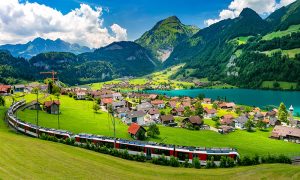New Zealand, with its beautiful nature, relaxedimmigrantsPolicies and a high quality of life have attracted thousands of people from around the globe to settle in the country. For many ordinary people who want to immigrate to New Zealand, the road to immigration can seem both promising and confusing. In fact, immigrating to New Zealand is not a quick fix, but as long as you understand the process and are well prepared, the average person can be successful. In this article, we will introduce you in detail how to succeed through a reasonable way and the right steps.Immigration to New ZealandThe
I. Understanding New Zealand's immigration policy
New Zealand immigration policyRelatively lenient, but also requires applicants to have certain conditions. The New Zealand immigration system consists of the following main categories of visas:
- skilled migrantVisa (Skilled Migrant Visa)
This is the most common immigration route for applicants with specific occupational skills. Through a scoring system, applicants are awarded points based on age, work experience, education, language skills, etc., and can only apply to immigrate once they have achieved a certain number of points. - Family Sponsorship Visa
If you have an immediate family member who is already a New Zealand citizen or resident, you can apply for immigration through a family reunification visa. - investment immigrationVisa (Investor Visa)
For applicants with financial resources, New Zealand offersinvestment immigrationVisa. This visa is for people who are willing to invest a certain amount of money in New Zealand. - Entrepreneur Visa (Entrepreneur Immigrant Visa)
If you are interested in starting a business in New Zealand and have the relevant experience, you can apply for a business start-up visa and obtain residency. - Temporary Work Visa (TAWV)
For foreigners who find a job in New Zealand and are granted a work visa to work and live in New Zealand, and after a period of time can apply for permanent residence.
Before choosing the most suitable visa category, it is advisable to understand the detailed requirements of each visa and choose the best path based on one's qualifications (e.g., education, occupation, language ability, etc.).
II. Preparation before applying for immigration
- Assessment of individual conditionsBefore applying for a skilled migration visa, you first need to assess your basic requirements. Skilled migration in New Zealand is based on a points system and applicants need to fulfill certain scoring criteria. The scoring factors mainly include:
- (a person's) age: In general, people aged 25-39 have the most advantage in terms of points.
- education attainment: Those with a bachelor's degree or higher are more likely to earn high scores.
- working experience: Three or more years of experience in a related field will increase points.
- English proficiency: A certain IELTS score is required.
- Enhancement of language skillsEnglish is the official language of New Zealand and English language proficiency is one of the key factors assessed when applying for immigration. Ordinary people gain higher immigration points by improving their English. For example, the language requirement can be met by achieving a certain standard (usually 6.5 and above) in the IELTS test. If you do not yet have the relevant score, it is advisable to prepare and take the language test in advance.
- Career assessmentIf you are a skilled migrant, make sure your occupation is on New Zealand's Shortage Occupation List. The New Zealand government publishes a Long-Term Shortage Occupation List (LTSSL), which lists the skilled trades that are urgently needed in New Zealand. Applicants who work in occupations that are on this list will have an easier time qualifying for immigration.
III. Application process
- Submission of Expression of Interest (EOI)The application process for skilled migration usually starts with the submission of an Expression of Interest (EOI).The EOI is a short form submitted to the New Zealand Immigration Department, which the applicant needs to fill out based on his/her personal circumstances. In the EOI, applicants are required to provide basic information about themselves, their qualifications and work experience. After submitting it, the Immigration Department will assess your points profile. If your points are above a certain threshold, you will have a chance to move on to the next round of screening.
- Waiting for an invitationIf your EOI passes the initial screening, you will receive an invitation letter from New Zealand Immigration inviting you to apply for a skilled migration visa. At this point, you will need to provide more detailed personal documents to the Immigration Department, including academic certificates, work certificates, language scores and so on.
- Filing a complete immigration applicationAfter receiving the invitation, the applicant needs to prepare all relevant documents and submit a complete immigration application. This process may take some time, as the immigration office will conduct a detailed review of the applicant's background, work experience, education, etc.
- Application resultsOnce the complete immigration application is submitted, the Immigration Department will review it, which usually takes a few months. If the review is successful, you will be granted permanent residency or a work visa in New Zealand and officially become a resident or citizen of New Zealand.
Four,Immigration to New Zealandpost-life
- Adapting to life in New ZealandThe pace of life in New Zealand is relatively slow, with a sound social welfare system and a high standard of living for the population. Forrecent immigrantsAdapting to New Zealand's culture and lifestyle is a necessary process. New Zealand emphasizes family and work balance and has a high level of social security and environmental quality.
- Finding a job and settling downDespite New Zealand's relatively stable economy, it still takes some time for the average person to find a suitable job. You can look for job opportunities through local job websites (e.g. Seek, TradeMe Jobs). After immigrating, make sure to build up a local network as soon as possible to integrate into the society and understand the job market in New Zealand.
- Access to welfare and medical servicesNew Zealand provides comprehensive medical coverage and social benefits for its residents. All legal residents are entitled to free or low-cost medical services. In addition, New Zealand provides various social benefits such as family allowances and child education allowances to help new immigrants better integrate into society.
V. Practical recommendations
- Hire a professional immigration consultantNew Zealand's immigration policy is relatively complex and the application process requires a great deal of preparation. Hiring an experienced immigration consultant can help you complete the application process more smoothly. An immigration consultant can provide you with professional advice and help you optimize your application materials to increase your chances of passing.
- Advance financial planningMigrating to New Zealand may require a certain amount of financial support, especially when applying for investment or business immigration. Even skilled immigrants need to have sufficient funds to meet their living expenses. Planning your finances in advance and being prepared for emergencies can make it easier for you to cope with life after immigration.
- Stay patient.The process of immigrating to New Zealand can be long and full of uncertainty. It is important to remain patient and positive throughout the application process. Don't be discouraged by short-term setbacks; persevere until the end and your immigration goals will be gradually realized.
concluding remarks
Overall, it is not out of reach for ordinary people to successfully immigrate to New Zealand. By understanding the policies, improving your personal conditions, planning the application process wisely, and making all the preparations for your life, you are well on your way to starting a new chapter of your life in this beautiful island nation. Whether you are going through skilled migration, family reunion or entrepreneurial investment, as long as you follow the right steps, the future belongs to you.








